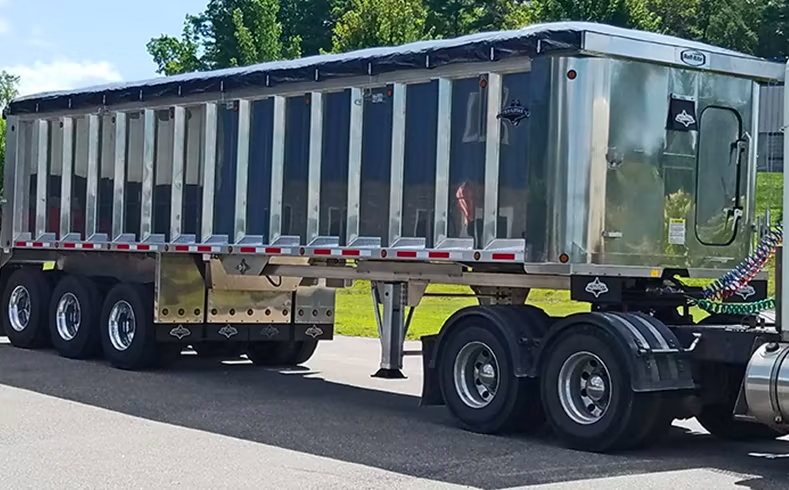
A cable tarp system is one of the most popular tarping systems on the market as it combines nearly unhindered access to the loading area along with reliable and weather resistant coverage of the load (when solid vinyl tarps are used). Fleet operators have trusted cable tarp systems for years to secure trailer loads and keep production flowing. Cable tarp systems are designed to provide end-to-end trailer coverage while providing easy and safe use for operators.
A trailer’s tarping system is vital to ensuring materials get the proper coverage they need during transportation. Some materials are heat and water sensitive, which makes preservation through tarping easier and more effective. The tarping system could be the deciding factor between your load making it to its destination or arriving in an undesirable condition.
Finding the right tarping system for your trailer is not an easy task but the right one will yield great results. This article will cover some of the top considerations when looking for the cable tarp system that’s right for your needs.
Selecting your cable tarp system
When it comes to assessing your truck tarp needs, there are different factors fleet managers and owner-operators should consider before purchasing. Unfortunately, to get the best results possible, there isn’t a one-size-fits-all cable tarping system for every heavy hauler. Here are some of our top considerations when looking for a new cable tarp system.
Electric vs. manual tarping
Cable tarp systems feature a tarp and bows that slide on your rails, are actuated by steel cables, and are recommended for applications needing unhindered access to the loading area. One of the most significant considerations for owner-operators and fleet managers is whether they should use manual or electric systems.
Both systems have their place in the industry, and both offer pros and cons. However, manual cable tarping systems demand more from operators on every load. Operators that manually cover their load spend more time on a single job site and create an increase for safety concerns.
Many trucking companies and heavy haulers experience great benefits when opting for an electric system. Many companies choose electric systems because:
- They do the hard work for the operator by automatically securing the load.
- Reduce time on a job site because securing the tarp is completed faster.
- Allow operators to stay in a cab or stand at a distance, thereby increasing safety.
Both types offer great benefits but determining the right one should be dependent on your priorities and needs.
Material
What type of material are you expecting to haul? Cable tarp systems are ideal for transfer trucks with pups and end dumps, belly dumps and live bottom trailers hauling material such as sand, gravel or other aggregates, asphalt, grain and other commodities.
Cable tarp systems provide load containment options ranging from anti-pollution with mesh tarps to semi-waterproof with vinyl tarps. Make a list of your requirements and identify what is working with your current solution and what needs improvement. The best tarp manufacturers offer easy access to digital guides and knowledgeable service representatives to help you measure and select the right system for you.
Single vs twin cable drive
In a single cable drive, the bows are attached to one continuous cable to prevent misalignment or jamming of the rear bow. Twin cable drive systems have two independent cables on either side of the body that join at the front drive assembly. The twin cable drive is the most prevalent in the industry where single cable systems are a more robust option offering more problem free tarping and simple single point cable tensioning, where each cable can be tensioned separately. Both options can be safely controlled from inside the cab and provide reliable load coverage, while the single cable features a more synchronized operation for high performance.
Wind whip
Cable tarp systems provide low profile tarp operation which reduces overhead clearance hazards and operational issues from windy conditions. If wind is a concern given your location, you might consider full length anti-lift roller kit that prevents a tarp from lifting in high-wind conditions.
Fuel efficiency
Is fuel efficiency important to you? Covering your load improves the aerodynamic performance of your truck or trailer and reduces drag and wind resistance. Look for an aerodynamic tapered front to help support fuel efficiency. Also remember that an ill-fitting tarp will cause more drag during transportation which affects fuel economy.
Professional fleet appearance
Do you consider the appearance of your fleet or business to be a factor? While this might be a lower priority for some, cable tarp systems offer a streamlined look because sliders and cables operate along the top rail leaving a clean appearance to truck or trailer sides. Consider a manufacturer that incorporates aluminum or zinc-plated parts for rust protection to help ensure a long-lasting professional profile for your vehicles.
Automated tarp solutions for trailers
Cable tarp systems are a great asset to most trailers due to their ease of use and dependability. They're highly efficient at securing loads and protecting the material being hauled. Introducing a cable tarp system to your trailer is one of the best decisions you can make. These systems provide exceptional benefits you'll reap for many years. You'll find a distinct return on your investment because of the system's overall efficiency.
Roll-Rite has been the industry leader in cable tarp systems for many years. Whether you equip your rig with a Super Slider or Top Slider style, you're introducing reliable cable technology for load securement. Check out our Power Cable Series and contact us if you need assistance identifying the right product for your specific rig.

 English
English  Français
Français  Deutsch
Deutsch  Nederlands
Nederlands  Français
Français  English
English  English
English 
